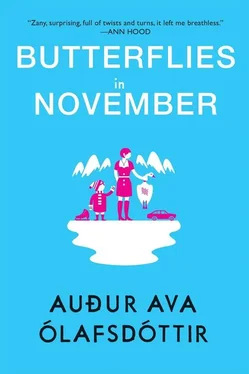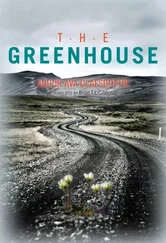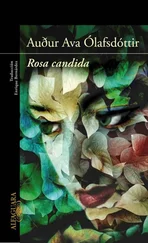“It’s night time,” I tell him, “it’s dark. I can’t see anything either. There are no pictures at night. Shall I tell you a story? Shall we invent a story together?” I try to create a story for him, speaking slowly and clearly, using the sign language I have learnt.
“No,” he says, “not like that.”
Every time I try to pick up the narrative thread again, he protests. He wants the story to be different. Finally he buries his head under the pillow, he doesn’t want a story. He just wants me to go away. I lift the pillow.
“Don’t you want to know how it ends?”
“No.”
“What about tomorrow?”
“Maybe,” he says unenthusiastically.
“Do you want to sleep in my bed? Do you want to climb in with me?” This is the permission he was waiting for. He swiftly bolts up again and drops his feet to the floor.
He takes his pillow with him and plonks it right beside mine. Then he fetches three fluffy animals, which he carefully lines up on the bed, side by side, with the smallest one wedged between the other two. I grab his duvet.
“Tomorrow we’ll go down the ravine with the truck and the shovel and we’ll build a dam in the stream,” I say, moving over in the bed to give him and his animals more space.
“Then we’ll make pancakes and go for a swim.”
When I wake up in the morning, the boy has disappeared and is nowhere to be seen. His duvet is still warm. I search for him everywhere and then rush outside calling his name, but naturally he can’t hear me. I run around everywhere in my boots and the white woollen sweater I’ve thrown over my silk nightdress, and then clamber down the ravine. Finally I see him silhouetted against the faint twilight, in his bare feet and Superman pyjamas, standing on a rock by the stream. He doesn’t budge, even after I’ve walked right up to him.
When I phone Auður, she confesses to me that Tumi’s quest for his father started one day when she collected him from kindergarten. That was when he’d asked who his father was and why he didn’t come to collect him.
“‘It’s a long story, I’ll tell you it when you’re five,’ I told him. That’s next autumn, so at least I have a year’s respite. Then, a few days later, as I was standing in a bookshop in town, the boy threw himself at a man who was a few places ahead of us in the line, wrapping his arms around one of his legs and endlessly repeating Dad Dad Dad. It was pretty embarrassing, not least because it was that sports presenter on TV, the one who always gets on my nerves. After that, he played the same trick on several other men, all very different from each other. It’s totally unpredictable, like his sleepwalking.”
We say no more on the matter and she asks me to help her find a word, an adjective to qualify something that falls on mankind, although not necessarily something of a meteorological nature, like rain, but a word associated with the apocalypse of the human soul and heart, but not in any direct way, more indirectly, like rain in the soul and nature oozing tears, she explains to me. Something like the smell of a birch tree in the rain, just one word. The obstetrician claims that no word could encompass that much, no single word could ever be that big.
“Could you think about it and give me a call tomorrow and maybe look up the ancient Greeks for me, if you get a chance, when Tumi falls asleep tonight?” The connection is rather poor and Auður’s voice sounds like she’s 5,000 miles away, although I can hear that she’s on a high, happy with her life and the weather.
“I’ve ripped off my clothes here,” she goes on, “and I’m about to go out into the rain in nothing but my socks to roll myself in the grass, just for the sake of breaking up the monotonous view patients have of the lawn. Too bad if the people in this ward have never seen a happy future single mother of three before. I recommend you do the same,” she adds. “They’re all at a meeting right now, trying to work out whether I should stay in the maternity ward or be transferred to the psychiatric one, just because I’m happy. If I die tonight I’ll die happy. Then there’s always a chance I’ll die giving birth to my twins.”
The voice has almost faded down the line. She has started to cry:
“I’m so scared of him sleepwalking, of him wandering into the water. I want to ask you not to sleep anywhere too close to the sea. Don’t go anywhere near water or snow with him.”
Then, switching topics, she adds: “Did you know that in the Bible there are 153 references to the past, but only fifteen to the future?”
Darkness looms over the pool and butter-coloured vapours dissolve into the sombre misty November sky above, as faces vanish and materialize, the diving board only half visible in the haze.
The best way to establish any real intimacy with the inhabitants of this village is in the hot tub, the best way to meet one’s fellow man is in this natural primeval state, where each person is as vulnerable as the next. Huddled together in a tight jacuzzi with my knees pressed against my chest, I can feel the burning warmth of strangers’ bodies in the sulphurous mist. This is pretty much the state God created me in thirty-three years ago, if one adds the swimsuit, sexual longings, life experience and obsessive memories.
People have just got off work and are tired. The summer colours have been drained from their bodies, and they’ve grown all pale and flabby again. Everyone reeks of the same blend of chlorine, this is about as equal as people can get. Most of them are with packs of small children who putter about in the baby pool, mostly unsupervised. The majority of the infants, who wear diapers on dry land, have clearly learnt how to float a good while ago. Next summer they plan to enlarge the pool and build a slide for the children and their fathers.
As Tumi is putting on his new swimming trunks under the shower, he says he wants to be like me. Be like me, I get that much.
“What do you mean like me?”
I think he says woman.
I slip two armbands onto him to make sure he always returns to the surface.
“I want you to stay put right here,” I say, trying to improvise the appropriate sign language with my hands.
“Stay put, only play in the splashing pool.”
He jumps up and down into the shallowest part of the pool, releasing all kinds of joyous shrieks, which he himself can’t hear. He is utterly transformed without his glasses and hearing aids, and looks even smaller and skinnier. His facial features seem to lose the sharpness his spectacle frames give them and blur into each other. I remind myself to pop into a store on the way home to buy some protein powder to stir into his cocoa.
I’ve never seen him this lively. He spatters and splashes and makes the jet of the fountain arch over the other children, who huddle together at the other end, following his moves with mute gaping mouths, wondering whether they should get their own back by pushing him under the surface or emptying a bucket of water over his head. At any rate, this seems to be the only kind of communication Tumi is interested in.
I’m taken aback by the number of tattoos in the tubs, both on the women and men. Virtually all the women have intricate motifs around their arms, and many of the men sport tattooed outlines of reindeer horns in the same area. There were also plenty of tattoos in the swimming pool on the other side of the sand desert, 150 kilometres from here, but the patterns are different over there, mainly of animals and roses.
“If we’re heading for a reversal of the poles,” says a man in the tub, “we’ll have to refigure what’s north and what’s south again, compasses won’t be reliable any more.”
“I can bring you the recipe tomorrow, if you like,” says another woman. “Instead of using ordinary crème fraîche, you can use bacon flavouring.”
Читать дальше












